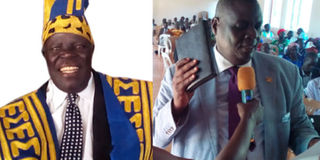Inside palace wars tearing apart Iteso Cultural Union

Emorimor of the Iteso Cultural Institution, Augustine Osuban. New administration. Former prime minister Paul Sande Emolot swears in as he Iteso Cultural Union chairperson last month. PHOTOS BY SIMON PETER EMWAMU
The 1987-1992 insurgency in Teso did not only bring gloom to the sub-region, but had wider outcomes, including loss of credible representation.
This is partly why the people of Teso joined the cultural institution bandwagon in the 1990s and established the institution of Emorimor, the Iteso Cultural Union (ICU), as a rallying platform for their development.
But the current squabbles in the institution threaten its relevance, and subjects are questioning its significance to their socio-economic transformation.
Genesis
With the Uganda People’s Army (UPA) rebels roaming around villages, few people were willing to be elected Movement cadres for fear of being targeted. But when peace and tranquillity finally returned, the need for a unifying front to champion the Teso agenda was thought of.
With Augustine Osuban Lemukol enthroned at a colourful ceremony in Katakwi District in 2000, many saw it as a chance to reshape the destiny of a society that had suffered years of displacement.
But close to two decades later, people are starting to lose hope in the institution, with the subjects saying Emorimor has lost grip of ICU, which has allowed opportunist to infiltrate the institution.
Cracks in ICU first emerged in 2011 when Ms Betty Akello, an elder who had envisioned the institution to have its own sources of income, walked out of ICU after cold water was poured on her efforts.
Mr Gabriel Ononge Opolot, a youth leader, says the Emorimor is partly to blame for failing to discern between members who wish ICU well and opportunists.
“Emorimor is being held hostage by a few notable people, led by the deputy spokesperson Jonathan Maraka, whose role in the institution I would say is to thrive under confusion,” he says.
The youth leader, whose brief stay at the institution was marred by intrigue, says the events leading to the Emorimor dissolving cabinet recently started in February 2016 after prime minister Paul Sande Emolot sold the idea of having youth leadership incorporated into the institution.
“Under this arrangement, I was charged with mobilising Iteso youth within Uganda and Katakwa in Kenya. We came up with initiatives to generate income for the youth, but this was viewed negatively by the Emorimor captors,” says Opolot.
“They didn’t only fight the youth desk, but also turned their guns onto prime minister Emolot. This was the start of the war.”
Opolot says when the ICU assembly sat in Soroti District on November 17, 2018, it was agreed that the constitution be amended to allow a place for the youth in the ICU, and also have all ICU council members approved by clans.
This, however, did not go down well with everyone, especially those who were afraid of losing their positions.
“The Emorimor is a product of select number of Iteso, so him failing to listen to majority persons in ICU and heeding to opportunist who have held him hostage is no surprise, the tenets of its establishment by the founder members, headed by Paphrus Imodot Edimu, have not been achieved,” Opolot says.
Mr Emolot, who by an act of the Emorimor dissolving cabinet lost his position as prime minister, but was elected chairperson for the ICU council on November 16, says his actions aimed at giving the institution an economic foundation have not always gone well with some members.
“I am a humble servant of the Emorimor and committed to serving under him. Those who peddled rumours have their own agenda,” says the former prime minister, adding that if he was as bad as others claim, he wouldn’t have been elected chairperson for the new ICU council.
Intentions to retire
Mr Vance Omome, the former deputy prime minister, says problems started two years ago when the Emorimor announced his intentions to retire, citing fatigue and poor health, which is provided for in the ICU constitution.
“Arrangements to have an electoral commission instituted were in high gear, but later opportunists who have held the Emorimor captive turned around, claiming we were bent at overthrowing the Emorimor,” says Omome.
The former deputy prime minister told this newspaper that unlike other cultural institutions, ICU has a timeframe for which the subjects serving in ICU council and cabinet can elect a new Emorimor on grounds of incapacitation.
“The Emorimor himself said he felt he was unfit to carry on in that position. This talk of a coup in ICU is idle talk,” says Omome.
But ICU spokesperson Jonathan Maraka says the cabinet was overdue for disbandment, its term having expired in 2015. He says because of the national elections at the time, it was hard to elect a new cabinet and council members as it would interfere with national elections.
“In September 2016, when ICU council was disbanded, it was agreed that cabinet continues to act for six months, until a time when ICU council is constituted, and this was done on November 9, 2019,” Maraka says.
On being accused of having a hand in the disbandment of the youth desk, the deputy spokesperson says the desk had to be cleaned.
“I am the one who advocated for youth interests, but these youth in particular stated doing dubious things. A commission of inquiry to that effect was instituted and a huge bombshell was unearthed. These youth were simply conning the community of huge sums of money, I had to reign in.”
Mr Maraka says the Kumi University scholarship that was secured by education minister Valerian Ejalu was squandered by the youth desk. On his reported wars with former prime minister Emolot, Maraka admits he had issues with the way Emolot was running ICU.
“I am not fighting Emolot. I am fighting to uphold the constitution,” he says.
The Emorimor, while dissolving his cabinet on November 16, acknowledged the existence of internal wrangles within the ICU, but was optimistic that it would be resolved with time.




